Ever Feel Like Your Mind Is A Browser With A Hundred Tabs Open, All Blaring Notifications At Once?
Table of Contents
ToggleUnderstanding Anxiety and Its Impact on Your Body
Before we dive into the best supplements for anxiety, it's essential to understand what anxiety is and how it affects your body. Anxiety isn't just "worrying too much"—it's a physiological response that can manifest in multiple ways, including:- Increased heart rate and palpitations
- Trouble concentrating or racing thoughts
- Muscle tension and headaches
- Digestive issues like nausea or an upset stomach
- Restlessness and difficulty sleeping
The 10 Best Supplements for Anxiety and Stress Management
1. Magnesium: The Calming Mineral
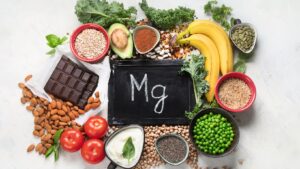 Why It Helps:
Magnesium is essential for nervous system regulation, and research suggests that deficiencies may contribute to heightened anxiety. It plays a role in muscle relaxation, neurotransmitter balance, and cortisol regulation.
How to Take It:
Why It Helps:
Magnesium is essential for nervous system regulation, and research suggests that deficiencies may contribute to heightened anxiety. It plays a role in muscle relaxation, neurotransmitter balance, and cortisol regulation.
How to Take It:
- Recommended dose: 200-400 mg daily
- Best forms: Magnesium glycinate or magnesium citrate for better absorption
- Foods high in magnesium: Leafy greens, nuts, seeds, and whole grains
2. Ashwagandha: The Ancient Adaptogen
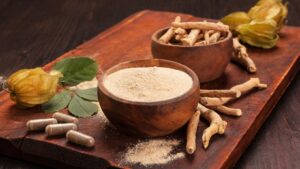 Why It Helps:
Ashwagandha is an adaptogenic herb known for its ability to reduce cortisol levels and improve resilience to stress. Studies have shown it can lower anxiety levels significantly in individuals with chronic stress.
How to Take It:
Why It Helps:
Ashwagandha is an adaptogenic herb known for its ability to reduce cortisol levels and improve resilience to stress. Studies have shown it can lower anxiety levels significantly in individuals with chronic stress.
How to Take It:
- Recommended dose: 300-600 mg per day
- Best form: Standardized root extract
- Best time to take: Morning or evening, depending on preference
3. L-Theanine: The Zen Compound in Green Tea
 Why It Helps:
L-Theanine is an amino acid found in tea leaves that promotes relaxation without causing drowsiness. It works by increasing GABA, serotonin, and dopamine—key neurotransmitters involved in mood regulation.
How to Take It:
Why It Helps:
L-Theanine is an amino acid found in tea leaves that promotes relaxation without causing drowsiness. It works by increasing GABA, serotonin, and dopamine—key neurotransmitters involved in mood regulation.
How to Take It:
- Recommended dose: 100-200 mg per day
- Best source: Green tea or supplements
- Combining tip: Works well with caffeine to promote calm focus
4. Omega-3 Fatty Acids: Brain-Boosting Essentials
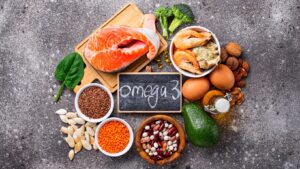 Why It Helps:
Omega-3s, particularly EPA and DHA, support brain health and reduce inflammation, which may contribute to anxiety symptoms. Research suggests that higher omega-3 intake is linked to improved mood and reduced stress levels.
How to Take It:
Why It Helps:
Omega-3s, particularly EPA and DHA, support brain health and reduce inflammation, which may contribute to anxiety symptoms. Research suggests that higher omega-3 intake is linked to improved mood and reduced stress levels.
How to Take It:
- Recommended dose: 1,000-2,000 mg of EPA/DHA daily
- Best sources: Fatty fish (salmon, mackerel), fish oil supplements
- Vegetarian options: Algal oil (plant-based omega-3s)
5. Vitamin D: The Sunshine Vitamin
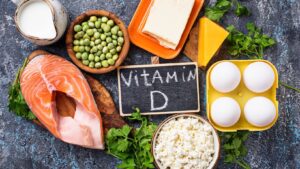 Why It Helps:
Vitamin D is crucial for mental well-being, and deficiency has been linked to mood disorders and increased anxiety. It plays a role in serotonin production, the neurotransmitter responsible for happiness.
How to Take It:
Why It Helps:
Vitamin D is crucial for mental well-being, and deficiency has been linked to mood disorders and increased anxiety. It plays a role in serotonin production, the neurotransmitter responsible for happiness.
How to Take It:
- Recommended dose: 600-2,000 IU per day, based on blood levels
- Best sources: Sunlight, fatty fish, fortified dairy products
- Deficiency risks: More common in people with limited sun exposure
6. GABA: Your Brain’s Natural Relaxer
 Why It Helps:
Gamma-Aminobutyric Acid (GABA) is the primary inhibitory neurotransmitter in the brain, promoting relaxation and reducing excessive neuronal activity associated with stress and anxiety.
How to Take It:
Why It Helps:
Gamma-Aminobutyric Acid (GABA) is the primary inhibitory neurotransmitter in the brain, promoting relaxation and reducing excessive neuronal activity associated with stress and anxiety.
How to Take It:
- Recommended dose: 250-750 mg per day
- Best time to take: Before bedtime for relaxation
- Additional tip: Works well with L-theanine for synergistic effects
7. Rhodiola Rosea: The Stress Fighter
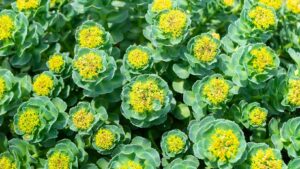 Why It Helps:
Rhodiola is another adaptogenic herb that enhances resilience to stress while improving mental performance. It has been studied for its ability to reduce symptoms of anxiety and burnout.
How to Take It:
Why It Helps:
Rhodiola is another adaptogenic herb that enhances resilience to stress while improving mental performance. It has been studied for its ability to reduce symptoms of anxiety and burnout.
How to Take It:
- Recommended dose: 200-600 mg per day
- Best form: Standardized extract with 3% rosavins and 1% salidroside
- Best time to take: Morning or early afternoon for energy balance
8. Probiotics: The Gut-Brain Connection
 Why It Helps:
Emerging research shows that gut health plays a critical role in mental health. Probiotics support a healthy gut microbiome, which influences neurotransmitter production and reduces inflammation linked to anxiety.
How to Take It:
Why It Helps:
Emerging research shows that gut health plays a critical role in mental health. Probiotics support a healthy gut microbiome, which influences neurotransmitter production and reduces inflammation linked to anxiety.
How to Take It:
- Recommended dose: At least 1-10 billion CFUs daily
- Best sources: Yogurt, kefir, sauerkraut, probiotic supplements
- Additional tip: Choose multi-strain probiotic formulations for maximum benefits
9. Valerian Root: Nature’s Tranquilizer
 Why It Helps:
Valerian root has been used for centuries to promote relaxation and improve sleep quality. It interacts with GABA receptors, similar to anti-anxiety medications, to calm the nervous system.
How to Take It:
Why It Helps:
Valerian root has been used for centuries to promote relaxation and improve sleep quality. It interacts with GABA receptors, similar to anti-anxiety medications, to calm the nervous system.
How to Take It:
- Recommended dose: 300-600 mg before bedtime
- Best use: Short-term relief of anxiety-related sleep disturbances
- Caution: May cause drowsiness; avoid before driving or operating machinery
10. Passionflower: The Herbal Calm Booster
 Why It Helps:
Passionflower is a traditional herbal remedy known for its calming effects. Studies suggest it can help reduce symptoms of generalized anxiety disorder (GAD) and improve sleep.
How to Take It:
Why It Helps:
Passionflower is a traditional herbal remedy known for its calming effects. Studies suggest it can help reduce symptoms of generalized anxiety disorder (GAD) and improve sleep.
How to Take It:
- Recommended dose: 250-500 mg daily or as a tea
- Best form: Capsules, tinctures, or dried leaves for tea
- Best time to take: In the evening for relaxation
Final Thoughts: Finding Your Inner Calm
Anxiety and stress are complex, and while supplements can provide valuable support, they work best alongside a holistic approach—regular exercise, mindfulness, proper sleep, and a balanced diet. Remember, not every supplement works the same for everyone, so it's essential to find what suits your body and lifestyle. If you're considering adding any of these best supplements for anxiety to your routine, consult with a healthcare provider to ensure safety and effectiveness based on your individual needs. With the right tools and a proactive mindset, you can take steps toward a calmer, more balanced life.Looking for Personalized Advice?
If anxiety is significantly impacting your daily life, it's always best to consult with a medical professional for tailored recommendations. Your journey to inner peace starts with taking the right steps—one mindful choice at a time!
Restore Your Gut Naturally7 Days, 7 Simple Meals!
Reset your gut in 7 days with 7 simple meals! 🌿💚 Improve digestion, reduce bloating, and feel amazing—one meal at a time!
About The Author

Medically reviewed by Dr. Nivedita Pandey, MD, DM (Gastroenterology)
Senior Gastroenterologist & Hepatologist
Dr. Nivedita Pandey is a U.S.-trained gastroenterologist and hepatologist with extensive experience in diagnosing and treating liver diseases and gastrointestinal disorders. She specializes in liver enzyme abnormalities, fatty liver disease, hepatitis, cirrhosis, and digestive health.
All content is reviewed for medical accuracy and aligned with current clinical guidelines.
About Author | Instagram | Linkedin




